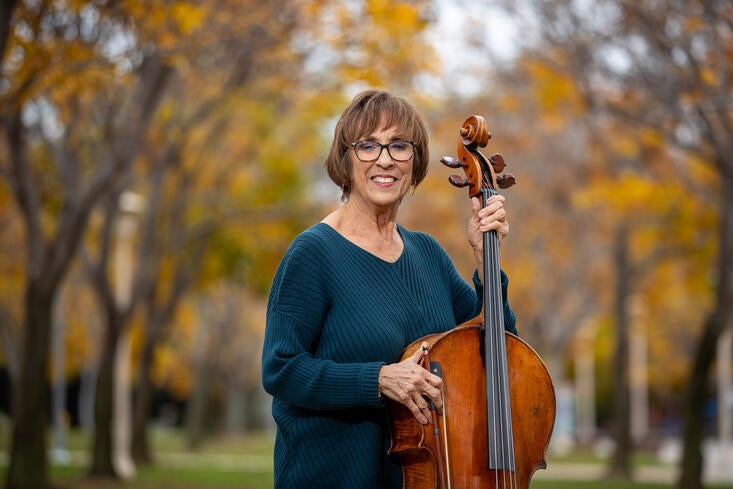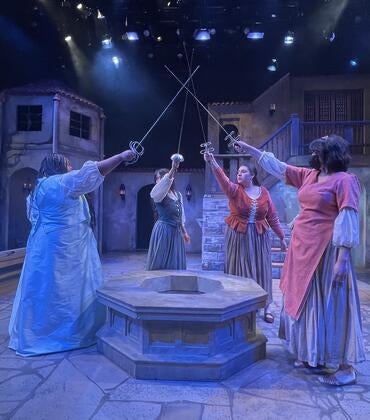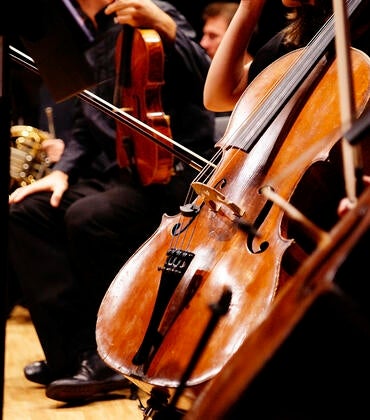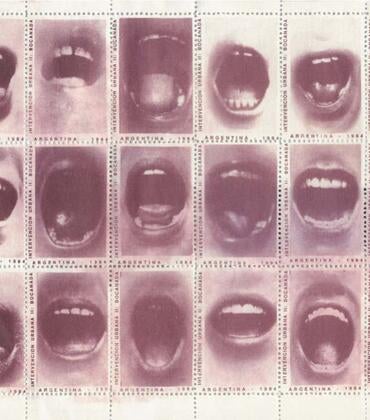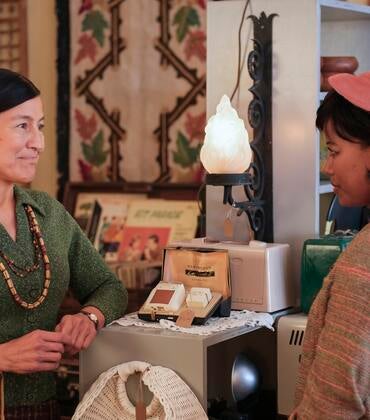
Ruth Charloff, the conductor of the UCR Orchestra, says the upcoming performance of UCR’s orchestra will begin with Henri Büsser’s orchestral adaptation of Claude Debussy's “Petite Suite for four-hands.” The suite Charloff said, “is an intimate piece.”
“Think about two people sitting next to each other on one piano bench at home and not the concert hall,” she said. “Büsser’s adaptation decks out the music in orchestral colors, keeping the fun, cozy feel of Debussy’s music.”
The second work of the evening will be Camille Saint-Saëns lovely and lyrical: “Cello Concerto No. 1,” featuring Ana Maria Maldonado as the soloist.
”This concerto is challenging in that there aren’t the traditional breaks in the movements,” said Maldonado, who teaches cello in the UCR Music Department. “It’s one continuous piece that is call-and-response with the orchestra. You hear the change in movements, but there is no pause. We depend on the conductor to keep us together.”
The audience will be treated to a concert where both the soloist and the orchestra complement and magnify each other. The energy and verve of Maldonado’s playing moves the listener to sit up straighter, then lean into the music coming at them like a freshening wind.
“It’s one of those pieces that as soon as I was approached about performing it, I began practicing it every day,” Maldonado said.
Maldonado’s dexterity and precision look and sound confident. This is from years of practice and playing. Taking up the cello at age 10, after studying the piano from 7, she went on to the University of Southern California/ There, her cello professor, Gabor Rejto, recommended her to Herbert Zipper for the Kennedy String Quartet to go to Bangkok, Thailand to promote Western Classical Music.
She went to Zipper’s home and played for him. Zipper felt because of her background — Mexican American and growing up on the border — that she would empathize with the Thai culture and fit in. During her time with the Kennedy String Quartet, she played across Asia. After finishing with the quartet, she played for two years in Germany with the Heidelberg Städtisches Opera Orchester. In both Asia and Germany, Maldonado taught cello and after returning to the United States began teaching in Southern California.
Charloff said the final performance of the evening will be a “mash-up symphony of four different composers with the typical framework of a regular symphony.”
“It will be a vivid emotional experience of symphonic music from 19th and 18th century composers,” she said. “The compositions span 110 years each separated by about 25-35 years, so will give the listeners a good sense of the evolution of symphonic music.”
“Each movement has its own qualities,” Charloff said. “The first is extroverted and rousing. Brahms’ movement is based on warm and lyrical folk songs and listeners will hear a drone that Brahms added in homage to Haydn’s Symphony 104. The second slows down and becomes introspective, tender, passionate, and lyrical. The third is lighter and meant to have fun. Because it’s based on the minuet, it has the qualities of a dance. In the case of Dvorak, it is two dances played simultaneously in cross-rhythm: a passionate waltz combined with a lively Czech ‘furiant.’"
"The fourth movement of the symphony is happier and brighter with fast tempo. Haydn’s playful fourth movement is also based on folk music influenced by the hurdy-gurdy and creates the drone Brahms used in his first movement. This creates a nice continuity. All the separate movements feel cohesive, strangely proportionate, and have a symphonic shape.”
The concerts are Saturday, Feb. 3 at 8 p.m. and Sunday, Feb. 4 at 3 p.m. at the University Theater on the UCR campus. Tickets are $10 for general admission; $8 for students, and $6 for children. Parking is free in lots 6 and 30. For more information, please visit https://events.ucr.edu/event/orchestra_feb_2024
